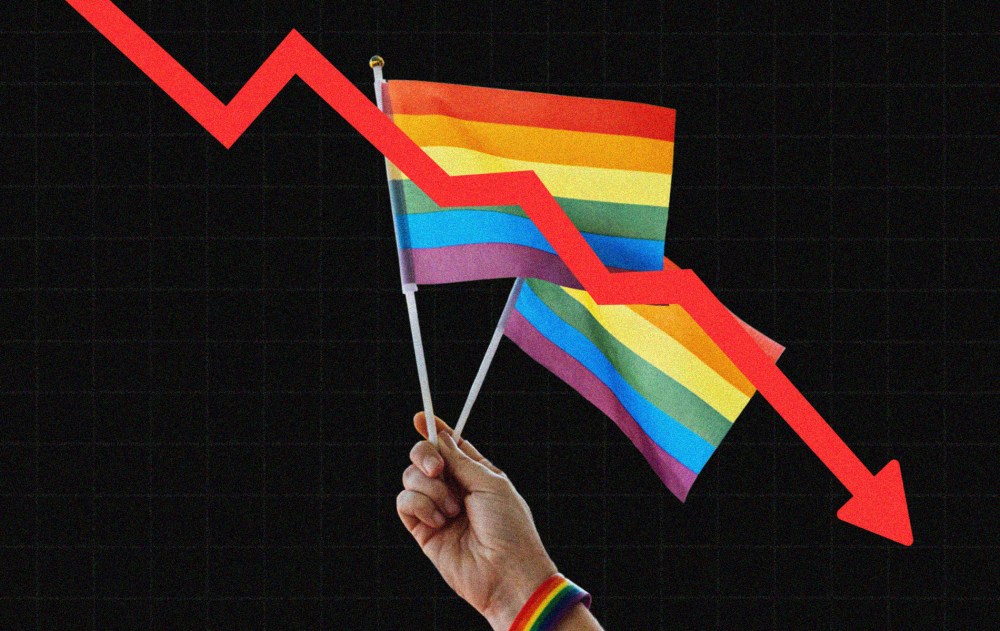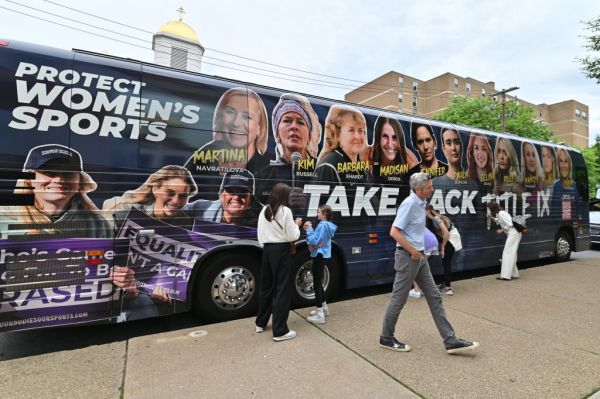If you’ve followed polling on social issues over the last decade or so, you’ve surely detected a pattern.
Support for legalizing marijuana? At an all-time high. Support for making abortion legal in all circumstances? At an all-time high. The share of Americans identifying as LGBT or “other”? At an all-time high.
Admittedly, that last one is due less to a population-wide shift than roughly a third(!) of Generation Z women calling themselves bisexual. But the point stands: Americans are, or were, becoming more socially liberal across an array of issues.
The supreme example is gay marriage. When Gallup first polled that subject in 1996, 27 percent of Americans supported legalization. By 2005, support had increased modestly to 37 percent. But by 2011, energized by state-court rulings and a surge of liberal activism, a majority of 53 percent had come to favor legalizing the practice.
Popular opinion never looked back. In May 2015, a month before the Supreme Court extended the constitutional right to marry to gays in Obergefell v. Hodges, support for legalization reached 60 percent. In 2021, it touched 70. Gallup’s latest survey, published on Thursday, found the number essentially unchanged at 68 percent.
It’s when you read the fine print that things get interesting, though.
Republican support for gay marriage over time has remained much lower than support among Democrats and independents, as you’d expect, but the trend on the right had been upward too. Just 22 percent of GOPers backed legal same-sex marriage in 2012, but within five years that share had more than doubled. Five years after that, 55 percent had come to favor legalizing gay unions. The onward and upward trend across all three partisan groups was clear and remorseless.
Then something changed.
In 2023, support among Republicans dipped to 49 percent. A year later it fell to 46 percent. As of last month it stands at 41 percent, the smallest share since 2016. The same trend is evident when the question shifts from whether gay marriage should be legal to whether gay and lesbian relations are morally acceptable. In 2022, 56 percent of GOPers said that they are—but the number plunged to 41 percent a year later. It dipped again in 2024, to 40 percent, and now stands at 38. That’s the lowest level since 2013.
What appeared to be a one-way ratchet in support for gay marriage has begun to turn the other way, at least on the American right. What happened?
A few things, I think.
The art of the possible.
Any major pivot on social issues that begins in 2022, as the GOP’s turn away from gay marriage appears to have, will naturally bend a political junkie’s mind toward abortion for an explanation. 2022 was the year that Roe v. Wade was overturned, after all.
Conservatives fought a 50-year war on all political fronts to make that happen, suffering setback after setback along the way. They saw state statutes challenging legal abortion struck down; they saw their candidates beaten at the polls in some cases for being too devoutly pro-life; they saw Ronald Reagan and George H.W. Bush fill the Supreme Court with Republican justices, only to have their appointees uphold Roe in 1992.
But then, in 2022, they won the war. They persevered and prevailed. It’s the greatest conservative cultural triumph of my lifetime.
Ending the constitutional right to abortion probably upended many Republicans’ sense of what’s realistically politically possible in 21st-century America. Some “soft” supporters of gay marriage within the GOP may have endorsed the practice up to that point mainly out of a sense of inertia, believing from Obergefell that the matter was settled and resistance was futile. The Dobbs ruling proved that that it isn’t; on the contrary, the right is now one Supreme Court ruling away from undoing all sorts of liberal legal victories.
Clarence Thomas himself made that point on the day Dobbs was undecided. In his concurring opinion, he urged his colleagues to revisit various landmark rulings derived from the now-defunct unwritten right of privacy—the right to purchase contraception, the right of gays to have sex without being penalized criminally, and, yes, the right of gays to marry.
Dobbs proved to social conservatives that no cultural issue is truly “settled” if they’re willing to fight on. Some who had come around to tepid support for gay marriage may have absorbed that lesson and swung back to opposition.
2022 was also the heyday of Ron DeSantis’ culture war in Florida. With Donald Trump sidelined, most of the political energy on the right was invested in the governor’s crusade against left-wing social values. From the so-called “don’t say gay” law to the Stop WOKE Act to a new 15-week abortion ban, the DeSantis offensive reinforced the new sense that where there’s a cultural will, there’s a way. All Republicans needed to win was leaders with the stones to legislate and judges with the integrity not to invent phony rights aimed at stopping them.
I’m reminded of the unnamed banker who spoke to the Financial Times a week before Trump was inaugurated in January. “I feel liberated,” he said. “We can say ‘retard’ and ‘pussy’ without the fear of getting cancelled … it’s a new dawn.” That guy had spent years conforming his behavior to a dominant liberal code of acceptable conduct and changed course the moment a right-wing victory ended its dominance. Why wouldn’t some Republicans feel similarly “liberated” about gay marriage once Dobbs broke the left’s stranglehold on legislating morals?
A trans backlash.
There’s an exception to the trend in Americans turning more liberal on social issues, of course. On the subject of transgenderism, the average joe sounds more like a Republican than a Democrat.
A New York Times poll conducted in January found 79 percent opposed to letting trans women compete in women’s sports versus 18 percent in favor. Another 71 percent opposed letting minors use puberty blockers or hormone therapy to change their sex. And a near-majority of 49 percent said society has gone too far in accommodating trans people, with 28 percent saying that a “reasonable balance” has been struck and only 21 percent believing more should be done.
Other polls have reached similar conclusions. Americans have gotten comfortable-ish with “LGB” but they’re stuck on the “T” part of the equation, probably because trans activism actually has imposed certain social costs that conservatives feared would follow gay marriage but didn’t.
In December, Dispatch contributor Jeremiah Johnson identified three reasons why leftist agitation for same-sex marriage succeeded and why that success has been hard to replicate. It was maximalist, demanding nothing less than full marriage equality. Civil unions wouldn’t do. It was also costless, emphasizing that gays marrying would impose no hardship on the rest of the population. And it was moral, asking that gays be granted the same dignity from legal institutions that the straight majority enjoys.
The problem, Johnson noted, is that those arguments don’t work as well in most other cultural disputes, like the one over transgenderism.
A supermajority of Americans believe it should be illegal to discriminate against trans people in matters like housing or employment. That’s a huge victory for the left, but many progressive activists seem unsatisfied by it and insist on maximalist concessions like granting minors access to gender-bending therapies. If you’ve staked your cultural victory on convincing adults to let kids medicate themselves into irreversible androgyny, you’re going to lose.
Trans activism isn’t costless either, as many women athletes struggle to compete against trans women of comparable skill who experienced male puberty. The most infamous case came when Lia (formerly William) Thomas, a middling male swimmer before transitioning, defeated an Olympic swimmer to win the NCAA women’s championship in 500-yard freestyle swimming. That was 2022—the same year Republican support for gay marriage began to fall, coincidentally or not.
As for morals, calling critics bigots works when you’re asking them simply not to impede a legal relationship between two people they’ll never meet, less so when you’re demanding that they agree that “trans women are women.” People will not be shamed into participating in an Orwellian pretense that gender-specific sex characteristics are malleable to the point of irrelevance.
My guess is that some meaningful number of Republicans who had grudgingly come around on gay marriage watched the left try to run the same playbook for trans acceptance and decided that the former wasn’t so harmless after all. If America hadn’t first accepted same-sex unions, the culture never would have tolerated Lia Thomas swimming in women’s events and nearly a tenth of the U.S. population wouldn’t now consider itself something other than heterosexual. Gay marriage did unleash a parade of horribles, they may have reasoned, by creating political space for trans activism to go mainstream. So they’ve changed their minds about it.
The Trump effect, aka the big sort.
An easy, almost irresistible theory about all this is that there’s a “Trump effect” behind it.
In 2016 the GOP base handed the party to an authoritarian selling nostalgia for lost American greatness. Trump himself was quite gay-friendly by Republican standards, as you’d expect for a lifelong New Yorker, but implicit in the nationalist idea is the belief that the country was better in every way when straight white men were running everything. You might expect a reactionary movement like his to have turned decidedly anti-gay after he won the presidency and took power.
But it didn’t. Not yet, anyway.
In May 2017, a few months after Trump was sworn in, Republican support for legal gay marriage reached a then-high of 47 percent. It dipped a bit in 2018 and 2019, but in May 2020 it rebounded to 49 percent, another record. In May 2021, four months after he’d left office, it broke through into majority support for the first time. Trump 1.0 didn’t halt the right’s shift in favor of same-sex unions.
But what about since then?
There are two stories one can tell about a “Trump effect” over the last three years that might partly explain Republicans’ turn away from gay rights. One is the ethos of “retribution” that he placed at the heart of right-wing politics beginning in early 2023 and which he revisited continuously over the next 18 months as his legal troubles deepened. His politics have always been about “hurting the people he needs to be hurting” but since 2023 the promise of taking revenge on enemies has animated his movement overtly to a degree it didn’t during his first four years.
The fact that the president himself hasn’t identified gays or gay marriage as targets for “retribution” might not have stopped some ambivalent right-wing supporters of same-sex unions from rethinking the issue in light of that ethos. If reelecting him was all about knowing “what time it is” and dismantling left-wing culture, stripping away rights won by gays in recent memory is an obvious avenue.
Remember that 12 Republican senators voted in late 2022 to codify same-sex unions in federal law, just in case the Supreme Court overturns Obergefell someday. The party’s own leaders evidently saw enough of a risk that a postliberal GOP will eventually begin demagoging gays to have taken preemptive legislative action against it.
There’s another way in which a “Trump effect” is driving the Republican slide on gay marriage, though. Namely, it’s part of the big sort.
Look again at Gallup’s new data and you’ll find that the GOP turning sour on same-sex unions is only half the story. The other half is Democratic support soaring to new heights, reaching record highs last month of 88 percent in favor of legal gay marriage and 86 percent who agree that gay and lesbian relations are morally acceptable. The partisan gap between left and right on both questions is now nearly 50 points.
What do you get when you combine surging Democratic support with crumbling Republican support? You get an overall level of American support for gay marriage that’s surprisingly … flat. Since May 2020, the share of the general public that says it supports the practice has gone from 67 to 70 to 71 to 71 to 69 to 68. All the churn has been below the surface, between the two partisan groups.
Which probably means that Americans aren’t changing their minds about gay marriage so much as they’re changing their party affiliations due (in part) to views they’ve consistently held about gay marriage. They’re sorting themselves according to their cultural preferences. Realignment, a key subplot of last year’s election and, really, of the last 10 years of American politics, has reached the issue of same-sex unions.
Trump’s law-and-order cultural program appeals to working-class voters, especially in contrast to progressive excesses like “defund the police” and open borders. Some blue-collar voters who used to vote Democratic for economic reasons but disdained the left’s agenda on crime, immigration, and matters like gay marriage and “pronouns” have concluded that the populist GOP is now a better match for them. The same is true in reverse, of course, for college grads who stuck with Republicans for years for their tax policies but disliked their hostility to abortion, gays, and immigrants. They’ve now become Democrats.
When left-leaning cultural conservatives move right and right-leaning cultural liberals move left, go figure that the Democratic Party will lean even more heavily in favor of gay marriage while the Republican Party will start to lean against it.
Everything is culture war! That’s the way Americans wanted it, so that’s now the way it is. I, for one, welcome our eventual Chinese overlords.







Please note that we at The Dispatch hold ourselves, our work, and our commenters to a higher standard than other places on the internet. We welcome comments that foster genuine debate or discussion—including comments critical of us or our work—but responses that include ad hominem attacks on fellow Dispatch members or are intended to stoke fear and anger may be moderated.
With your membership, you only have the ability to comment on The Morning Dispatch articles. Consider upgrading to join the conversation everywhere.